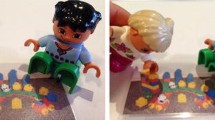Abstract
Social problem solving skills in 84 elementary school aged boys were assessed to identify those responses most salient in the prediction of ratings of aggressive and socially withdrawn behavior. Aggressive and socially withdrawn boys did not differ from the control group in the number of effective first solutions generated to the hypothetical stories. The control group generated significantly more effective solutions as second alternatives to the stories than did the aggressive or socially withdrawn boys. In addition, the number of effective second responses generated significantly predicted both aggression and social withdrawal after controlling for verbal problem solving. Results are discussed in terms of differences in cognitive processes as well as implications for treatment.
Similar content being viewed by others
References
Achenbach, T. M., & Edelbrock, C. (1983).Manual for the Child Behavior Checklist and Revised Child Behavior Profile. Burlington, VT: Department of Psychiatry, University of Vermont.
Butler, L., & Meichenbaum, D. (1981). The assessment of interpersonal problem-solving skills. In P. C. Kendall & S. D. Hollon (Eds.),Assessment Strategies for Cognitive-Behavioral Interventions. New York: Academic Press.
Fischler, G. L., & Kendall, P. C. (1988). Social cognitive problem solving and childhood adjustment: Qualitative and topological analyses.Cognitive Therapy and Research, 12, 133–153.
Guerra, N. G., & Slaby, R. G. (1989). Evaluative factors in social problem solving by aggressive boys.Journal of Abnormal Child Psychology, 17, 277–209.
Hollingshead, A. B. (1957).Two Factor Index of Social Position. New Haven, CN: Yale Station.
Kazdin, A. E., Esveldt-Dawson, K., French, N. H., & Unis, A. S. (1987). Problem-solving skills training and relationship therapy in the treatment of antisocial child behavior.Journal of Consulting and Clinical Psychology, 55, 76–85.
Kendall, P. C., & Fischler, G. L. (1984). Behavioral and adjustment correlates of problem solving: Validational analyses of interpersonal cognitive problem solving measures.Child Development, 55, 879–892.
Richard, B. A., & Dodge, K. A. (1982). Social maladjustment and problem solving in schoolaged children.Journal of Consulting and Clinical Psychology, 50, 226–233.
Short, E. J., Evans, S. W., Friebert, S. E., & Schatschneider, C. W. (1991). Thinking aloud during problem-solving: Facilitation effects.Learning and Individual Differences, 23, 109–122.
Shure, M. B., & Spivack, G. (1972). Means-end thinking, adjustment, and social class among elementary-school-aged children.Journal of Consulting and Clinical Psychology, 38, 348–353.
Wechsler, D. (1974).Manual for the Wechsler Intelligence Scale for Children-Revised. New York: Psychological Corporation.
Author information
Authors and Affiliations
Additional information
This research was partially supported by a grant to the first author from the Charles Rieley Armington Foundation on Values in Children. The authors wish to thank Dennis Drotar, Douglas Detterman, and Met Evans for their assistance with this project.
Rights and permissions
About this article
Cite this article
Evans, S.W., Short, E.J. A qualitative and serial analysis of social problem solving in aggressive boys. J Abnorm Child Psychol 19, 331–340 (1991). https://doi.org/10.1007/BF00911235
Issue Date:
DOI: https://doi.org/10.1007/BF00911235




